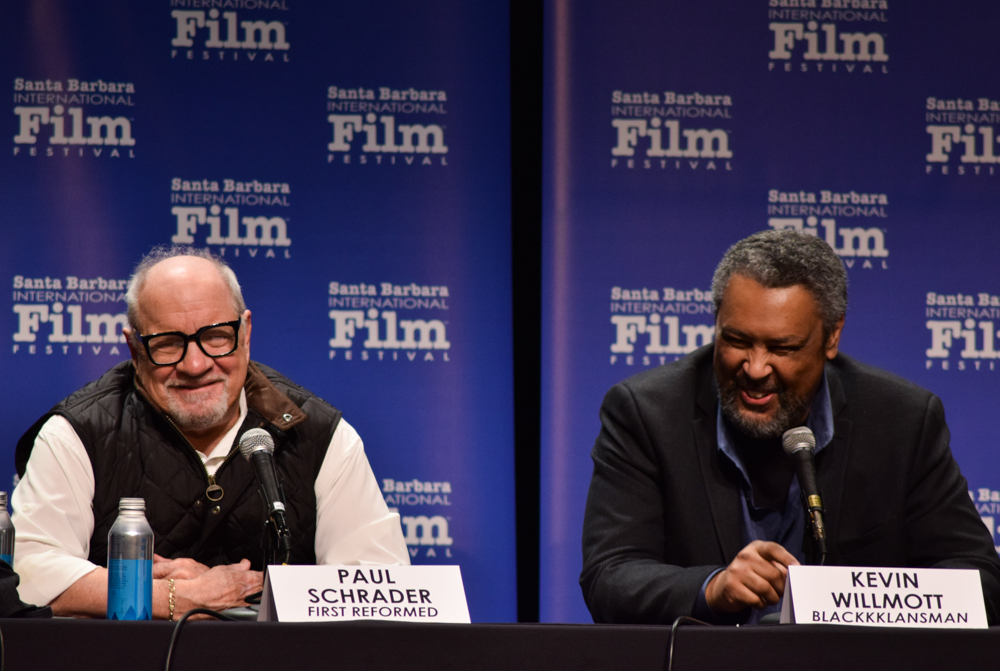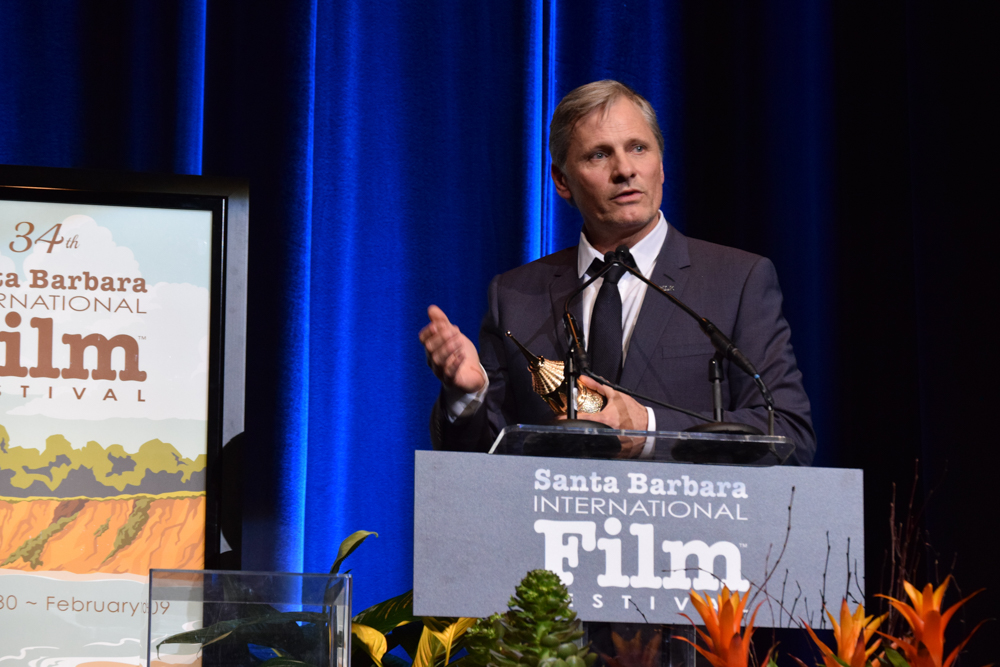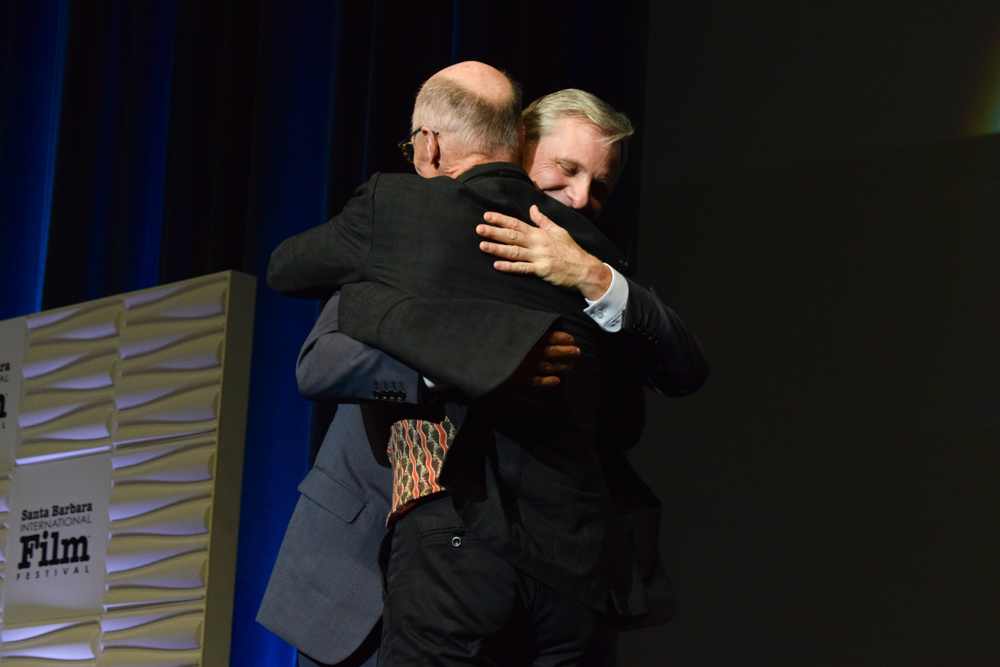Day 4: Screen Heroes Transcend Rain
Viggo Mortensen and Screenwriters Panel

Saturday’s torrential rain had a strange, twofold effect on SBIFF operations. On the plus side, inclement weather has always been a friend to those diehard fest-goers who spend much of the ten-day fest run indoors. On the downside, however, the debris-flow closure of Highway 101 cut the traffic flow between Santa Barbara and L.A./Hollywood, preventing the arrival of important panelists and tributes on a busy day for both.
Thus, the ever-popular Writers Panel was reduced to 2.5 guests — the great Paul Schrader, riding high on his powerful First Responder, and Kevin (BlacKkKlansman) Willmott; Will (A Star is Born) Fetters showed up halfway through the event — and Glenn Close’s tribute was postponed until today at 3 p.m. Viggo Mortensen did show up for his afternoon Arlington tribute, an hour late; and he only made it thanks to the heroic rescue effort by Santa Barbara Aviation, who picked up both Mortensen and actor Ed Harris at Camarillo airport after they were turned back thanks to the 101 closure.

Mortensen, currently amid his Oscar-nomination “tour” for Green Book — and one of the more thoughtful and gracious SBIFF tributees in memory — finally settled onstage saying, “This is the one chance I get to get an important award, and not just be nominated. The forces of nature aren’t going to keep me away.”
He engaged in a substantive conversation with moderator Pete Hammond, opening with his early inklings about pursuing a life in acting (he is also a multi-lingual multi-tasking musician — once married to X’s Exene Cervenka — author, photographer, poet, publisher, producer, and swordplay specialist). After a childhood deprived of any cinema, he delved into the arthouse greats — Bergman, Bresson, Ozu — and was beguiled by the transformative skills of good actors. As he told us, “These people are doing some kind of magic trick and I wanted to figure out how they did it. I’m still trying to figure it out.”
At age 60, and with a respected career in motion, he has clearly figured something out — although, despite Oscar nominations, remains under-appreciated. Mortensen’s filmography ranges from lucrative, star-making turns in the Lord of the Rings trilogy to memorable work with visionary director David Cronenberg (Eastern Promises, A History of Violence, and A Dangerous Method, in which he played Sigmund Freud).

After getting his American Riviera Award from Ed Harris, Mortensen expressed his appreciation for the afternoon: “This felt like being in a living room talking about movies. I prefer conversations to sound bites.” Offering gratitude for his life and work at the moment, his mantra was, “Sue me if I complain about anything.”
Speaking of Bergman and Bresson, Saturday’s rain-out phenom had the positive side effect of giving us more “Schrader time” at the Lobero’s Writers Panel. The unique American filmmaker literally wrote the book on the French filmmaker Robert Bresson (Transcendental Style in Film: Ozu, Bresson, Dreyer). Watching Bergman, he found a filmmaker grappling with issues of the sacred and the profane — a touch point in Schrader’s work, especially in his masterpiece First Reformed. But it was Bresson’s film Pickpocket that was an epiphany for the strictly Calvinist-raised Schrader, resonating with his “sacred past and profane present.” Pickpocket was even a model for his career-launching feat as screenwriter for the Martin Scorsese classic Taxi Driver, as well as First Reformed, which also freely borrows juice from the Bresson’s Diary of a Country Priest.
Shockingly, Schrader, 72, and with a stellar resume, earned his first Oscar nomination this year, for the First Reformed screenplay, but it’s a film deserving more Oscar love than it got: Ethan Hawke’s tortured pastor performance is a career high and a Best Picture nod would be proper for what is, for some of us, the greatest American film of 2018.
Not incidentally, it is also Schrader’s long-awaited masterpiece. As he explained at the Lobero, it all began three years ago after speaking with his friend, Polish director Pawel (Cold War) Pawlikowski (seen at the Arlington director’s summit tribute last Thursday). Pawlikowski spoke of his love of Schrader’s book, triggering Schrader’s self-realization that “It’s time now to make that film you said you’d never make. Once I crossed that Rubicon, it was surprisingly easy.” Earlier, he said, “It only took 50 years to make.”
Asked about the mystical — and controversial — ending of First Reformed, Schrader half-explained “I knew I had to leave the mortal plane,” and described the fantastical climax as “a Koyaanisqatsi of the underworld.” In it, he was seeking “a burst of carnality in a film that has none. People have to decide if [the pastor is] alive or dead.”
In short, Schrader has painted his sacred-profane masterpiece, which has both an immediate impact and leaves us in a challenged, questioning state. That’s not a typical condition in American movies, and Schrader’s no average American filmmaker.
Films to See: The Canadian film Nose to Tail implicitly asks the cinematic question: Why are we so fascinated by asshole chefs? Director-writer Jesse Zigelstein digs into that character type and literally won’t let go, coming up with what may well be the least likable character in this year’s SBIFF. Character actor turned scene-munching anti-hero Aaron Abrams brings a mean, menacing intensity to the role of a chef-owner of a high-profile Toronto restaurant (also a handy location setting for this modestly budgeted indie film) on the verge of coming undone. Self-absorbed and habitually cruel to others, his saving grace, as we see it, is the artful cuisine he meticulously creates in the maelstrom around him — the “food porn” element of the film.
We are trained to expect a character realization and shift by film’s end, as with Bradley Cooper’s bitter chef who discovers his buried is heart in Burnt, but (semi-spoiler alert) no transformation is in store. As Zigelstein explained in a Q&A after last night’s U.S. premiere screening: “I deliberately wanted an unsympathetic character, and was wondering if the audience would go with it.” This audience member did, appreciating the fresh, cool air of a film with a nasty protagonist who never comes clean. But we love to hate him, right to the bitter, bruised end.
One of many films this year helmed by a woman, director Bettina Oberli’s With the Wind is also one of the more impressive items on the programming menu. Ironically, I watched this saga of a willfully traditional, old school farm on the morning after seeing John Chester’s glorious farm-to-film doc The Biggest Little Farm (about a dazzling traditional farm in Moorpark), but the Swiss drama comes from the dark side of the farming story. The primary farmer is dogmatically fixed to off-the-grid, anti-technology, anti-capitalist ideals, to a fault.
Trouble is astir on the home front when a handsome engineer erects a wind turbine on the property, stirring up a nefarious love affair with the farmer’s wife/partner (beautifully played by Melanie Thierry). The key subject and narrative angle of a frustrated married woman’s passions is subtly cast amidst other themes, including questions about forms of energy represented by the wind power vs. the after-effects of nuclear power in the form of a visiting teenager from Chernobyl and the contrast of human struggles vs. the beauty and antiquity of a windswept parcel of farm land.
Director Li Cheng’s José is an illuminating, naturalistic slice-of-life story in Guatemala City, revolving around the fragile existence of the eponymous José, a 19-year-old who lives with his mother and happens to be gay (this we know, among other things, from uncensored sex scenes). Aside from the particulars of the story, José also offers a fascinating and rare glimpse of life in Guatemala, from religious rituals to social protests, colorful bustling street life, and the roots-reminding presence of Mayan ruins. The film is a sad story, but also a humanizing portrait of one of the Latin American nations sadly demonized by Trump (aka “King Tang,” according to BlacKkKlansman screenwriter Willmott, at the Lobero panel).
Comic Relief Pick: Check out the Argentine film Not Quite Adults, director Federico Sosa’s zesty and just irreverent enough road trip flick about barely thirtysomething would-be couple (including perky charmer Paula Reca), and absentee father’s lover, and a suggestive urn of ashes. Eccentric plot twists, warm empathy baths, a sparkly sense of visual style and recurring highs on the laugh meter make it a thumbs-up fest choice.
[ Click here to view the complete coverage. ]



